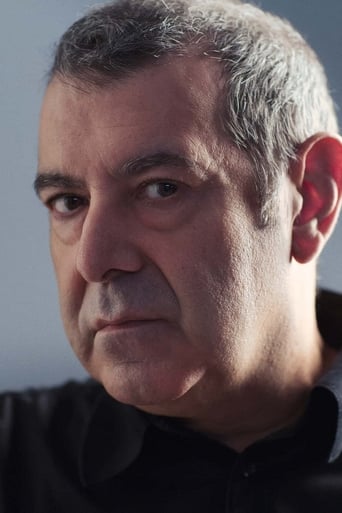Scanialara
You won't be disappointed!
PodBill
Just what I expected
Gurlyndrobb
While it doesn't offer any answers, it both thrills and makes you think.
Brendon Jones
It’s fine. It's literally the definition of a fine movie. You’ve seen it before, you know every beat and outcome before the characters even do. Only question is how much escapism you’re looking for.
Chad Shiira
At a deposition, the son stares into the whites of the camera and informs on his father. When we first meet Pablo(Juan Jose Ballesta), he's playing a daredevil game by the track with some other boys. The possibility of a miscalculation with the oncoming train and their mad dash across the railway is what concerns us. That's what we fear may kill the boy, not his father. In the hardware store, Jose(Alberto Jiminez) talks to his blood employee with a terseness that puts a damper on the moment, but the boy seems to have grown accustomed to these severe exchanges. Pablo walks and talks around the store freely enough, without a quiver or hitch in his voice, or an eggshell in sight. Pablo doesn't act like a child who's been burned with cigarettes and forced to drink his own urine. In the deposition, he lies about his brother; the son that dad loved the best, the ghost that Pablo competes against. He tells the camera "that I should have died, and not my brother," which suggests the father's golden boy didn't perish before Pablo was born, contrary to what he told his schoolmate Alfredo(Pablo Gallan).In essence, Pablo is talking directly to the audience, his witnesses to the brutal beating that Jose dispenses after the boy lies about his whereabouts for a second time. Playing on our sympathy, Pablo makes claims against his father that "El Bola" fails to support, as evidenced by the boy's relative ease around his father. With great subtlety, when the fourth wall is broken, "El Bola" transforms Pablo into a narrator, a fallible one, because the father seems more like a taskmaster than an incorrigible child abuser.Perhaps "El Bola" was too overly concerned with presenting the father as a flawed man, a man still grieving over the death of his first-born, rather than an irredeemable monster like the Robert DeNiro character in "This Boy's Life". If he purportedly tortured his son with lit cigarettes and ridiculed him with names such as "idiot" and "f*****", however, Pablo wouldn't think twice about challenging the authority of such an unpredictable parent with a tendency to shoot first and ask questions later. At the dinner table, Pablo's reaction time is somewhat slow when he's asked to refrain from playing with a ball; and at the front door, his conversation with a friend continues long after he's told to either come inside, or continue gabbing out in the hallway. This show of defiance suggests that a stern lecture, not horrifically violent retribution is the more likely end result for such insubordination. Even the film itself, on a subconscious level, knows that Pablo's father is hardly the man that Pablo describes to the off-camera interviewer. When Jose approaches Alfredo's family to help him search for his runaway son, there's no accusatory outburst about the bruises on Pablo's face and body. If somebody felt that their son's friend was a battered child, the father wouldn't be accord him any cordiality or unconditional respect as they patrol the streets at night in the tattoo artist's car(Alfredo's father).But "El Bola" wants to end on a stirring note, so out from the mouth of a babe, pours out all this stored-up vitriol towards the man who always treated him like a consolation prize. If the film truly believes that Pablo's testimony is factual, then it misses the mark, because there's not enough supporting evidence to back up the boy's claims. The cynic who understands that children lie to get what they want(Pablo probably wants to live with Alfredo's family) will find "El Bola" more rewarding than the viewer with a bleeding heart(like the person who cries out "but what about the children?" as a response to any social ill). Be a cynic: be aware that "El Bola" switches from third-to-first-person narration when it matters the most.
murdockcrc
Unfortunately, child abuse is still something that is seen these days, even in countries so much developed as Europe.In this case, El Bola is the story of a kid physically abused by his strict and violent father. The movie does a great job to show the whole panorama of this complicated situation. El Bola's life is surrounded by misery, his family is a chaos, his mother is submissive to her aggressive husband, his situation at school is not better, and in general, the movie shows how being abused causes the abused kid to fail is every aspect of life.El Bola meets a new friend, which turns out to have a great and loving family. This is part of the other part of the problematic: how normal families fail to act appropriately when they find out a child they know is beaten up by his parents.In summary, the movie exposes this hard topic with class and elegance, sometimes showing very brute and harsh scenes, that nonetheless, are necessary to shake up the audience's feelings and make them understand the importance this matter has.
Natalie
An excellent film which exposes a very real problem via a neo-realistic film style. This film achieves something the postmodern style could never have achieved with all the spectacular colors, effects, sounds in the world. This film looks abuse in the face and shows that there is a way out, if there's someone there to help. This is a must-see film, but if your Spanish isn't doing so hot, the English subtitles will do very little in helping to understand the film. If you can, don't use the subtitles at all, as they'll more likely distract than help (at least that was the case for me). Anyway, check out this extremely moving and beautifully real film.
Keith F. Hatcher
At present, unfortunately, Spain is suffering the highest level of child-beating and badly treated wives of all Europe. Around 60 women are killed each year by their husbands, ex-husbands, lovers, etc., and every day children are taken into hospitals after being savagely beaten by, mostly, their fathers, though there are also frequent cases of both mother and father taking part in the treatment metered out.It would not be strictly correct to affirm that this film, `El Bola' directed by Achero Mañas, reflects this sociological situation, and probably was not the intention anyway: there were other important issues that had to be unveiled, too. However, in brief, we could say that the film is basically concerned with the physical punishment Pablo (El Bola) receives from his father, a small business owner, frustrated and bored with life. Pablo receives refuge from a sympathetic family, but the problems do not stop there.Well directed, above all keeping the violence within strict proportions to the import of the story, and in general good interpretations which do not tend to unnecessarily exaggerate the crude and difficult situations being enacted. Special mention, of course, is well deserved for the main actor – Juan José Ballesta, about 11 years old. He had a very secondary rôle in `El Embrujo de Shanghai' (qv), and thus surprised me at being able to deliver such a performance in this film: obviously the director's careful handling of the young lad, as well as some excellent rapport with the other actors, especially Nieve de Medina, holds the film on course. I hope that this younger generation of Spanish directors, such as Achero Mañas and of course Fernando León de Aranoa (Los Lunes al Sol, qv, also with Nieve de Medina) can keep up the good work in the sociological sphere with real human stories to tell.WARNING: this film necessarily includes a scene of extreme child violence carried out by his overwrought father, and thus care should be taken by parents. The Spanish rating of only for over 13s should not be taken seriously: over 18 would be more appropriate. The scene is short; the film is not only about violence as it has many other ingredients. However, this brief scene is very hard on the senses.



